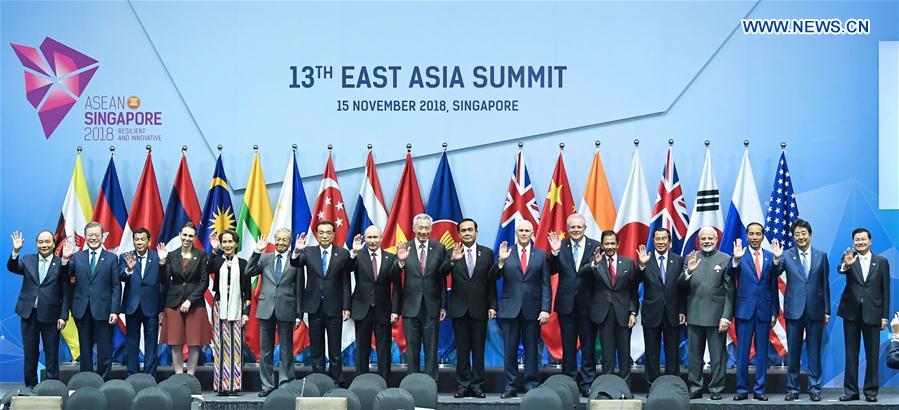Premier Li calls for consultation, mutual openness to maintain peace, prosperity in East Asia
Chinese Premier Li Keqiang on Thursday called on countries in the region to enhance equality-based consultation and mutual openness so as to maintain peace and prosperity in East Asia.
Chinese Premier Li Keqiang on Thursday called on countries in the region to enhance equality-based consultation and mutual openness so as to maintain peace and prosperity in East Asia.

Chinese Premier Li Keqiang poses for a group photo with leaders attending the 13th East Asia Summit in Singapore, on Nov. 15, 2018. [Photo/Xinhua]
Li made the remarks at the 13th East Asia Summit held Thursday afternoon in Singapore, which gathered leaders of the ten member states of the Association of Southeast Asian Nations (ASEAN) as well as Australia, China, India, Japan, New Zealand, Russia, South Korea and the United States.
Li said the East Asia Summit, launched 13 years ago, has become a major platform for dialogue and cooperation in East Asia and played an important role in boosting mutual understanding, maintaining regional peace and stability, and promoting development and prosperity.
He stressed that against the backdrop of rising instability and uncertainty on the global horizon, there is a need to uphold the concept of living together in harmony and win-win cooperation, enhance consultation on an equal footing and promote mutual openness so as to maintain peace and prosperity in East Asia.
The Chinese premier made a five-point proposal for further increasing regional cooperation.
Firstly, countries should adhere to multilateralism.
China advocates the building of a new type of international relations featuring mutual respect, fairness and justice, and win-win cooperation, Li said, adding that China stands ready to work with all sides to safeguard the rules-based international order.
Secondly, countries should safeguard free trade.
Li called for concerted efforts to build an open world economy, support the multilateral trading system with the World Trade Organization at the core, and promote trade and investment liberalization and facilitation.
Thirdly, countries should make efforts to expedite regional economic integration.
With regional free trade arrangements picking up steam, all sides should show political decisiveness to work toward an early conclusion of the negotiations on the Regional Comprehensive Economic Partnership (RCEP) and advance openness, cooperation and inclusive development at a higher level, Li said.
Fourthly, countries should boost regional cooperation on sustainable development.
All sides should further promote cooperation in the key areas of energy and environment, education, finance, public health, disaster management as well as ASEAN connectivity, Li said.
He said China will continue to hold seminars on new energy and maritime management, advocate joint research on earth science and promote inclusive development.
Fifthly, countries need to conduct political and security dialogue and cooperation.
Stressing that China advocates a vision of common, comprehensive, cooperative and sustainable security, Li said China is willing to conduct cooperation with other countries in such areas as anti-terrorism, climate change and cyber security and hold a joint exercise on anti-terrorism in 2019.
On the South China Sea issue, Li said a peaceful South China Sea is the common aspiration of all parties and in line with the interests of all countries in the region.
China stands ready to work with countries in the region to make the South China Sea a sea of peace, friendship and cooperation, he said.
China is committed to pushing forward Code of Conduct (COC) consultations with ASEAN countries, and the two sides have worked out a single negotiating text this year, Li said.
At the China-ASEAN summit on Wednesday, China and ASEAN members agreed to complete the first reading of the draft within 2019, Li said, adding that China also proposed to conclude COC consultations in three years, so as to allow countries in the region to safeguard with rules the peace, stability, free trade as well as freedom of navigation and over-flight in the South China Sea.
China, said the premier, hopes for countries outside the region to respect and support the efforts in this regard made by their counterparts in the region.
Leaders attending the summit agreed that the East Asia Summit has produced remarkable progress since its launch in 2005 and become a major part of the ASEAN-led regional open framework.
All parties hailed the fruitful results produced in areas such as environment, energy, disaster control, connectivity, trade and maritime cooperation within the past year, and called for joint efforts to better synergize development strategies and enhance cooperation on sustainable development, connectivity and blue economy.
The leaders agreed that countries also need to jointly address global challenges such as cyber security, terrorism and climate change and resolve regional hotspot issues via diplomatic means.
They also pledged to speed up RCEP negotiations and enhance trade and investment liberalization and facilitation in the region.
The summit adopted several outcome documents including a statement on ASEAN smart cities.

